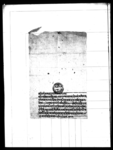A rukkā from King Rājendra ordering Lakṣmīdāsa to buy rice for later sale to the people of Bhaktapur (VS 1897)
ID: DNA_0010_0111
Edited and
translated by Manik Bajracharya
in collaboration with
Rajan Khatiwoda
Created: 2015-06-10;
Last modified: 2018-06-20
For the metadata of the document, click here
The accompanying edition, translation/synopsis and/or commentary are available under the terms of the Creative Commons Attribution-ShareAlike 4.0 International License
Abstract
This rukkā of the King orders Lakṣmīdāsa to purchase rice during the month of Maṅsira and sell it at below market value to the people of Bhaktapur in the month of Caitra and Vaiśākha.Diplomatic edition
[1r]
1श्री\[royal seal]1स्वस्तिश्रीमन्महाराजाधिराजकस्यरूक्का¯¯ ¯¯ ¯¯2आगेलक्ष्मिदास्प्रतिसहरभादगाउकाप्रजाहरूलेवर्षामावेसाहा
3गर्ननपाइषानपाउदैनन्भंन्याकुरोहाम्राहजूरमाजाहेरहुदाता
4हिका९७सालकाआम्दानीमध्येरूपैया५००१लेमंसिरमहिनामा
5धानचाव़लषरीदगरिताहिकादर्वारमावढिय़ाजगामाथनक्या
6ईचौकीपहराराषीचैतवैसाषमाकिफायत्सितविक्रीगरिष
7रीदवीक्रिकोज्माषर्चवुझाइफारषतिलिन्यागरइतिसम्वत्१८
8९७सालमितिआश्वीनसुदि६रोज६शुभम्¯¯¯¯¯¯
Translation
[1r]
Śrī[royal seal]Hail! A rukkā of the venerable supreme king of great kings.
To Lakṣmīdāsa.
It has been reported to us that the people of the city of Bhādagāũ, in the rainy season, are unable to buy their daily supplies and do not get to eat. Therefore, using Rs. 5,001 from the city's revenue of the year [VS 18]97, buy unhusked and husked rice in the month of Maṅsira. Store it at a proper place inside the palace of that city, and set up a security-post for its protection. (Then,) in the months of Caitra and Vaiśākha, sell (the grain) at below market value. Receive a clearance certificate after submitting the total account of the purchases and sales.
Friday, the 6th of the bright fortnight of Āśvina in the [Vikrama] era year 1897 (1840 CE). Auspiciousness.
Commentary
This document, dated VS 1897 (CE 1840), is a rukkā of King Rājendra (r. 1816-1846) addressed to Lakṣmīdāsa. The document orders Lakṣmīdāsa to buy and properly store rice grains worth Rs. 5,001 during the harvest season in Bhaktapur. It is then mentioned that the grains should be sold to the people at a reduced price during the dry summer season when people are unable to buy it due to scarcity.
The adressee of the rukkā, Lakṣmīdāsa, is probably the same Lakṣmīdāsa who moved to Sikkim from Bhaktapur and eventually became the first Municipal Commissioner of Darjeeling during the British Raj. For more on this Lakṣmīdāsa of Sikkim, see B. Shrestha 2005: 26-28.
An edition of this lālamohara has been published in S. Rāṇā et al. VS 2049: 6.

